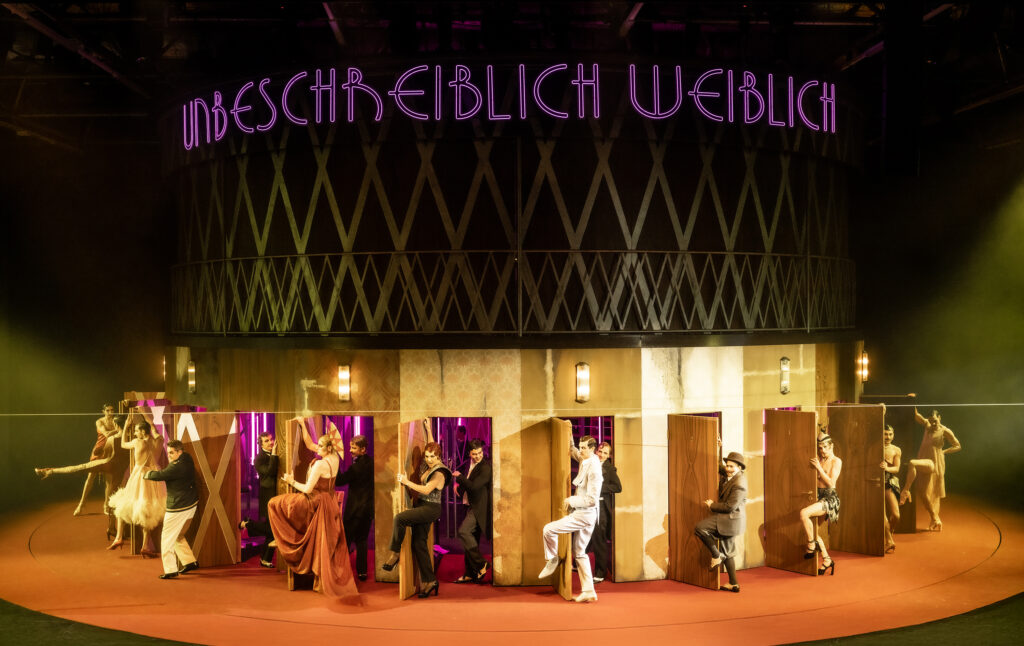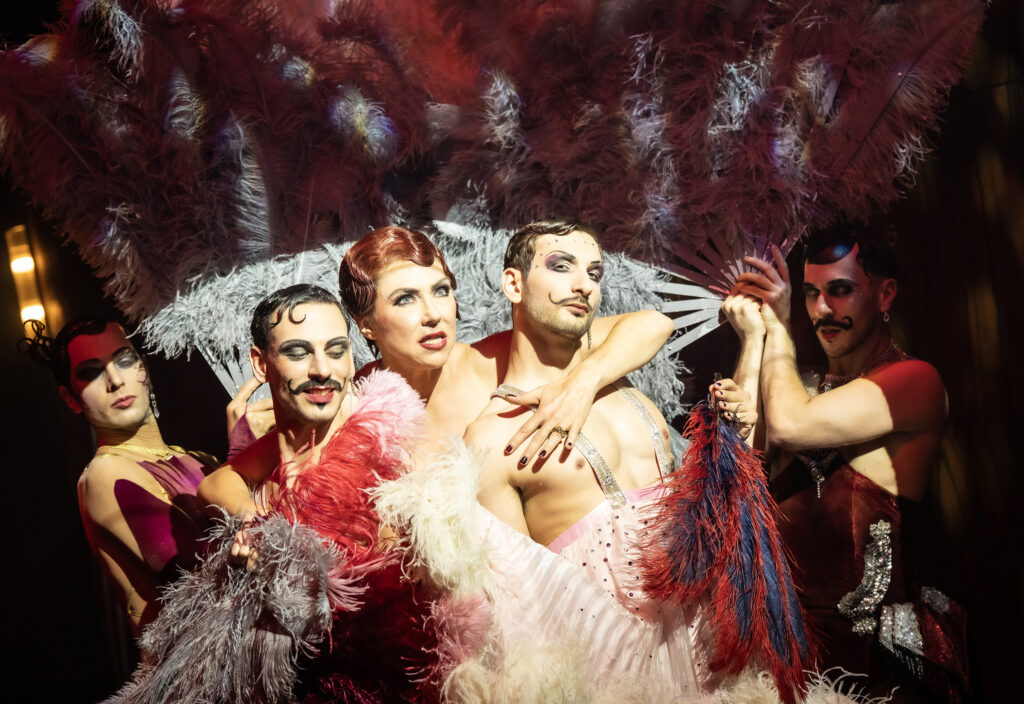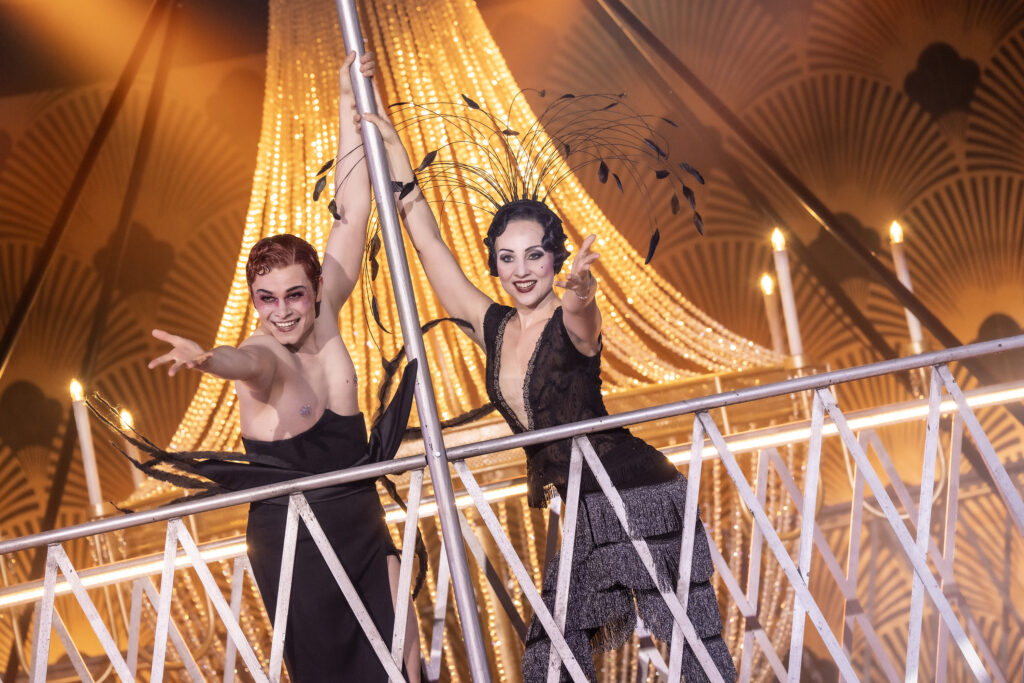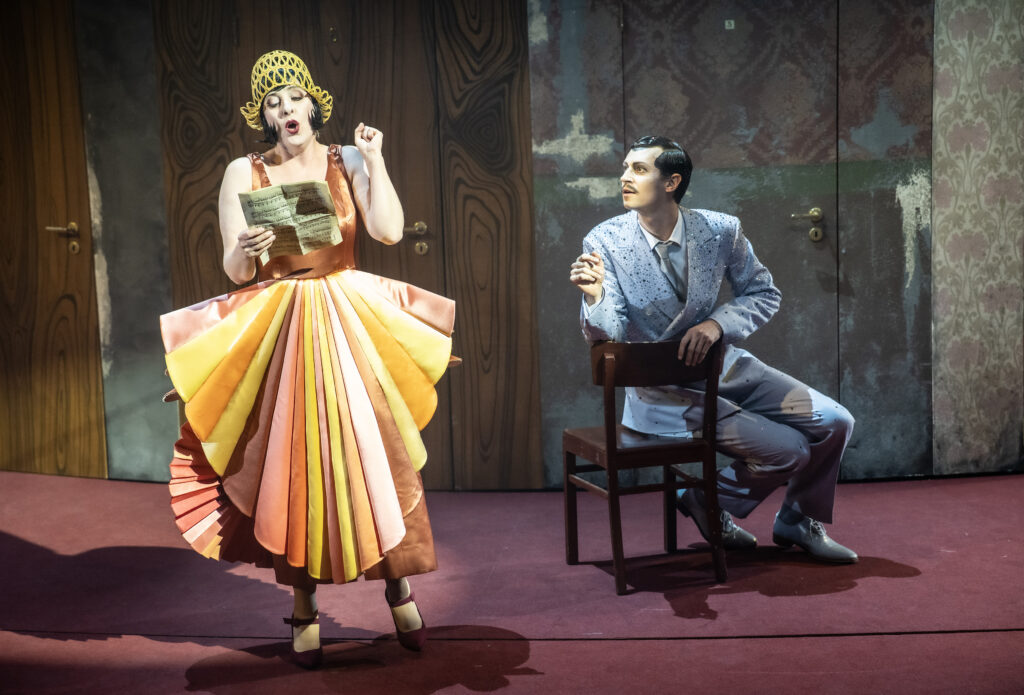Feminist-queer operetta wonder: Christian von Götz revitalises Michael Krasznay-Krausz’s ‘Eine Frau von Format’ at the Cologne Opera – with contemporary aspirations, frivolous verve and Annette Dasch.
At the end, he, even not gay, comes back from Pride Night in a glittering yellow dress, and she, a bit of everything, is once again wearing a top hat and tails. And because he, the Hungarian diplomat, despite his length, didn’t get the trade contract from the Silistrian princess, but she, the diplomat from Turkey, was able to win it with tact and finesse at the right moment, they could now both follow their hearts and get married the old-fashioned way, because she likes him in that dress. “But where should we live together? In Hungary? In Turkey? In Saxony?”

The whole cheerfully queer revue that director Christian von Götz has conjured up from the rediscovered operetta ‘Eine Frau von Format’ by Michael Krasznay-Krausz at the Cologne Opera is suddenly given a serious moment of pause. Annette Dasch in the title role expresses her hope, that the theatre should not remain the only island where such freely diverse behaviour is possible. And she has also continued in own words one of the operetta’s sparkling couplets, ‘Liegt im Bereich der Möglichkeit’ (Lies in the realm of possibility): ‘When we all join forces and explore diversity, then liveliness emerges as the most beautiful possibility!’
It has to be said that Annette Dasch and a fabulously enthusiastic ensemble put in a magnificent performance here, often very tightly dressed, for a turning point, especially in the often so reactionary operetta of the Austro-Hungarian Empire. Who can still put up with these patriarchal old-man plays by Strauss and Lehár? A reflection of old Vienna still haunts Krasznay-Krausz’s revue, but it has already been caricatured by him and has now been given a really smart feminist-queer makeover by the Cologne directors.

In contrast to the thoroughly sophisticated version of the queer ‘Weißes Rössl’ recently staged by Immo Karaman at the Staatstheater Braunschweig, in which the magic of the season with Rössl-Wirtin en travesti was then suffocated by Nazi empire and 1950s stink, for express an actual warning, empowerment remains dominant in Cologne. Admonition, yes, but equally important is encouragement, the self-confident living out of constitutionally guaranteed diversity. And this succeeds in Cologne with a carnivalesque festive mood, but also with cheekiness that is highly infectious.
Of course, a genderfluid costumed choir with embroidering gentlemen and crisp revue dancers contribute to this, as do the brisk changes in the folding of the loggia doors and the small cast changes: Kammersängerin Dalia Schaechter plays the corrupt chancellor rather than the scheming baroness, while Uwe Tobias Hieronimi has stepped into the parlour dress with a rich bass and perfect posture.

The dialects are great fun, especially Stefan Sevenich as a real Cologne dialect speaking bass buffo, er consul general. And of course Richard Glöckner as the bohemian Leibhusar Pista, speaking German with bohemian accent, who laments his tenor buffo suffering and occasionally also speaks Saxon. He remains the prince of hearts in both versions and even more so in the dress of Dasch, as so often in operettas, and knows how to play and sing it charmingly.
Of course, dialects have their social differences. As the Hungarian Count Géza, Wolfgang Stefan Schwaiger brings the fine Austro-Hungarian Viennese with him, not Hans Moser’s little-people mumbling, as well as a cultivated baritone for the duet with Dasch and can also be seen in a sauna towel. Annette Dasch, on the other hand, speaks the Turkish diplomat Dschilli Bey in sober, superior Deutsches-Theater-Berlinisch, not like taxi driver Fritze Flink. Her commitment to liberalness is not just verbal; under the pretext of the couplet ‘Wir wollen tun, als ob wie Freunde wären’ (We want to act as if we were friends), she strips the Count down to his pants, then covers his naked cleavage with only her hands or feathers, and elicits shot after shot of erotic self-confessions from him. Played with consummate nonchalance, sung with the appropriate speaking tone and then again with blossoming beautiful soprano notes, simply a woman of calibre.

Adam Benzwi gives the Gürzenich Orchestra an appropriate head of steam, making tango flip and ‘My Baby, my Boy’ swing. Michael Krasznay-Krausz, born into a Jewish family in 1897, successful as an operetta composer from 1923, then gradually expelled from Berlin and Vienna by the Nazis, died in exile in Budapest in 1940, fascinates audiences with his rather ditty-like, often diseuse-like songs, which Fritzi Massary once interpreted at the premiere of ‘Frau von Format’ in 1927 at Berlin’s Theater des Westens. Musical verve, a little sentiment, cheeky lyrics such as ‘Schwör mir keine Treue’ and modern openness in terms of relationships make the work contemporary today. In Cologne, an exemplarily fresh, at times reflective, but above all encouraging realisation was achieved. Hopefully there will be a revival and guest performances in Berlin!